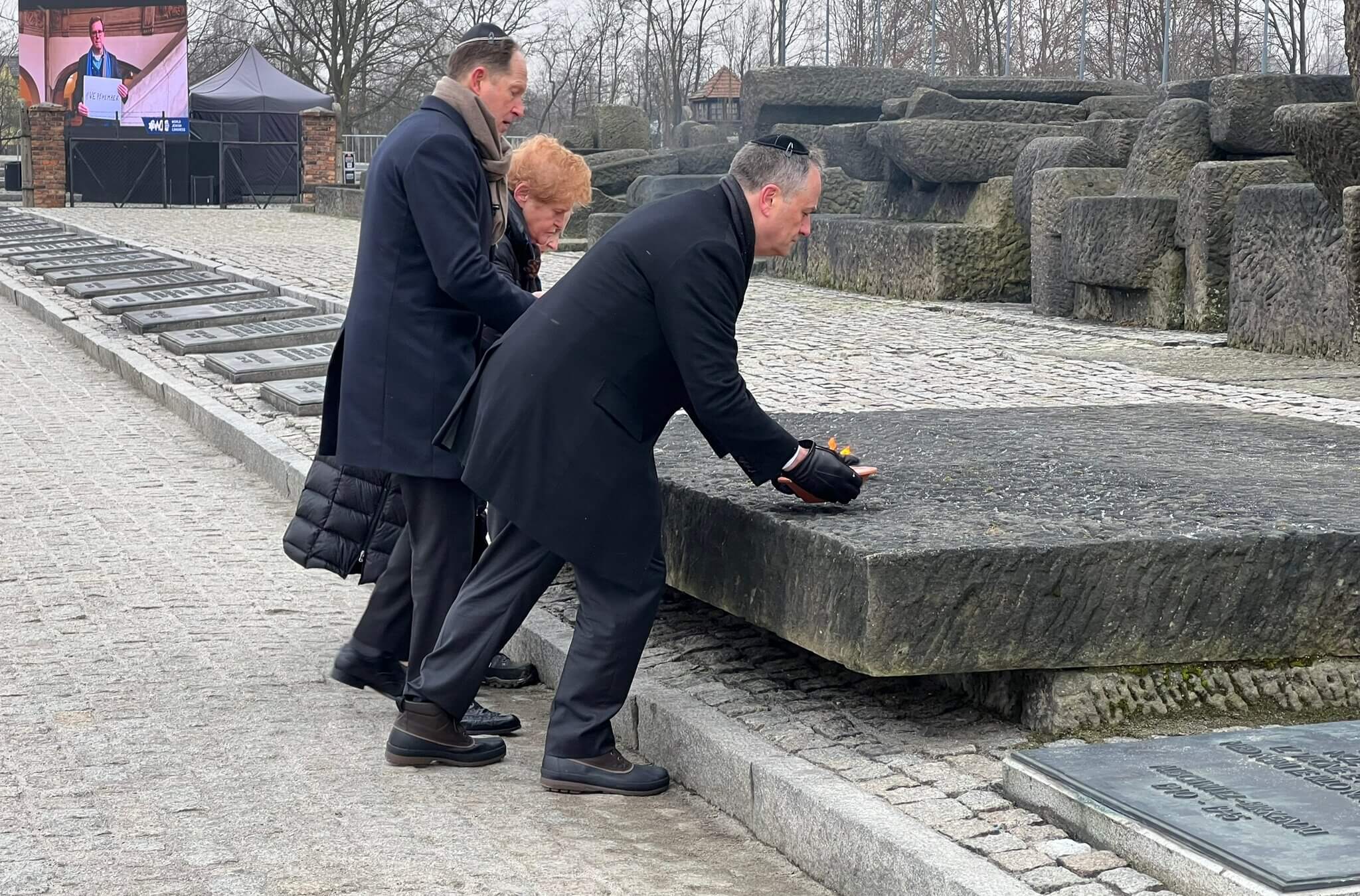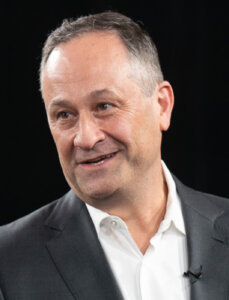We’re visiting Auschwitz because the fight against antisemitism didn’t end with liberation
Second gentleman Doug Emhoff and U.S. antisemitism monitor Deborah Lipstadt write from Poland

Ambassador Deborah Lipstadt, U.S. Ambassador to Poland Mark Brzezinski and Second Gentleman Doug Emhoff lay bowls of fire at a memorial in Birkenau. Photo by Laura E. Adkins
(JTA) — Today, we will visit Auschwitz-Birkenau to mark International Holocaust Remembrance Day. We will represent the United States and honor the lives of 6 million Jews and millions of others murdered. While at Auschwitz, we will also express gratitude to the survivors and speak of the lessons learned in that era of terror.
As we reflect on history, we know that the bigotry that fueled the Holocaust did not end when the camps were liberated. Antisemitism may be considered one of the oldest forms of hatred, but its insidious impact and its deep dangers are not relegated to the past.
Antisemitism is increasing at home and abroad. Hatred of Jewish people simply for being Jews is real and rising. We can only stop this scourge if governments and community leaders declare it unacceptable and inconsistent with our values.
With that in mind, we will convene community leaders in Poland to discuss efforts underway to combat antisemitism. Then, we will travel to Berlin, where we will meet with foreign government officials, who are also dedicated to turning the tide of hate. Our goal is to deepen our relationships with European partners — in and out of government — to combat the rise in antisemitism.
We can learn from each other and share our best practices. We can lead through our shared values of equality, diversity, and human rights. This moment calls on us to take action, together, based on these values.
It’s too often that we hear stories about attacks on Jewish communities. We see vandalism, threats, and violent, hateful rhetoric. People used to be afraid to say the ugly epithets and lies out loud. Now they are literally screaming them.
Related: Explore Emhoff and Lipstadt’s entire itinerary for their Poland and Germany trip
In 2018, a horrific antisemitic assault stole the lives of 11 innocent people at the Tree of Life synagogue. In 2019, a gunman opened fire at California’s Chabad of Poway, killing one and wounding three more people in an attack motivated by antisemitism. And just last year, in Los Angeles, we saw antisemitic banners hung over a freeway.
Heinous and senseless acts of violence bring pain to the Jewish community. We’ve heard from parents who are worried about sending their children to preschool at their Jewish community center because they fear for their safety. They must explain to their children why the synagogue they attend has an armed guard at the entrance while the church across the street has none.
In December, we both attended a roundtable at the White House convening Jewish leaders in the United States. We spoke about the impact antisemitism is having on their communities including issues of safety, education, and accountability. Under the leadership of President Joe Biden and Vice President Kamala Harris, we have increased funding for physical security of nonprofits and synagogues, and appointed leaders to focus on hate crimes and track and fight antisemitism.
Through a whole-of-government approach, the Biden-Harris Administration is crafting a broad-based national plan to address antisemitism. The first mandate of the interagency is to create a U.S. National Action Plan on Antisemitism.
But we know there is more work to be done. We each need to do our part to educate those around us and instill knowledge in the next generation of leaders to help fight antisemitism. We cannot and will not allow this to be normalized and politicized. We all have a responsibility to speak out and make clear that antisemitism is wrong, just like every other prejudice. We must all condemn antisemites as dangerous and also call out those who don’t. In the face of evil, there is no neutrality. Standing silent is not an option. Indeed, silence is what allows vile oppressors to thrive and this malicious virus of hate to grow.
It is time — yet again — for us to replace the silence, of the past and present, with a chorus of voices making antisemitism a relic and this horrific hatred a thing of the past.
The views and opinions expressed in this article are those of the author and do not necessarily reflect the views of JTA or its parent company, 70 Faces Media.
















